Vyvanse and Adderall are two commonly prescribed medications for the treatment of ADHD. Understanding the differences between these medications is crucial for those seeking appropriate treatment. This article will compare Vyvanse and Adderall, providing insights into their mechanisms of action, common uses, similarities, and differences.
We will explore the efficacy and potential side effects of both medications. Lastly, we will discuss factors to consider when choosing between Vyvanse and Adderall, emphasizing the importance of consulting with a healthcare professional. By delving into the specifics of these medications, individuals can make informed decisions about their ADHD treatment options.
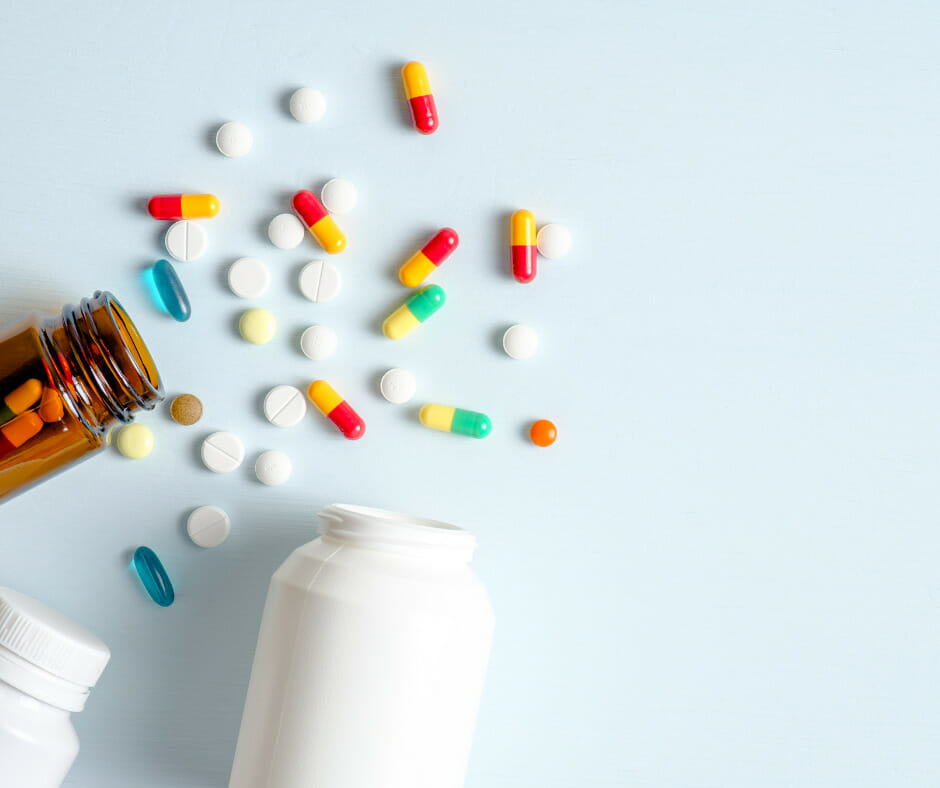
Vyvanse vs. Adderall: Comparing Two Common ADHD Medications
As explained by Brain Haustein and Alex Kampstra in The Unique Metabolism of Lisdexamfetamin (AKA Vyvanse), Lisdexamfetamine (Vyvanse) and Adderall treat ADHD by delivering amphetamine to the frontal lobe of the brain, imitating neurotransmitters that may be deficient in individuals with ADHD. Here is a comparison between the two:
| Aspect | Vyvanse | Adderall |
|---|---|---|
| Active Ingredient | Lisdexamfetamine | Amphetamine salts |
| Release Mechanism | Prodrug – needs to be metabolized in the body to become active | Immediate-release and extended-release formulations available |
| Dosage Frequency | Once daily | Can be taken multiple times throughout the day |
| Duration of Effect | Lasts up to 14 hours | Immediate-release: lasts around 4-6 hours, Extended-release: lasts around 10-12 hours |
| Approved Age Range | 6 years and older | 3 years and older |
| Side Effects | Common side effects include decreased appetite, trouble sleeping, dry mouth, and increased heart rate. Rare but serious side effects include psychosis and cardiovascular problems. | Common side effects include decreased appetite, trouble sleeping, dry mouth, and increased heart rate. Rare but serious side effects include psychosis and cardiovascular problems. |
| Drug Interactions | Interacts with monoamine oxidase inhibitors (MAOIs). It is important to disclose all medications being taken to a healthcare provider. | Interacts with monoamine oxidase inhibitors (MAOIs). It is important to disclose all medications being taken to a healthcare provider. |
Pro-Tip: Consult with a healthcare professional or experts at an institution like Lantana Recovery to determine which medication (Vyvanse or Adderall) is most suitable for you or your loved one with ADHD. Factors such as individual responsiveness, desired duration of effect, and the presence of any pre-existing medical conditions should be considered.
Understanding ADHD
Understanding ADHD is crucial for effectively managing this neurodevelopmental disorder. ADHD, or Attention-Deficit/Hyperactivity Disorder, affects both children and adults, causing symptoms of inattention, hyperactivity, and impulsivity.
Approximately 9.8% (6 million) of children in the US according to the Centers for Disease Control and Prevention (CDC). It significantly impacts daily functioning, including academic performance, social interactions, and overall quality of life.
ADHD is believed to have a genetic component and is often seen in families. Other factors like brain structure, chemical imbalances, and environmental influences can also contribute to its development.
Diagnosing ADHD involves a thorough evaluation by a healthcare professional, including a review of medical and family history, physical examination, and symptom assessment. The disorder has different presentations, such as predominantly inattentive, predominantly hyperactive-impulsive, and combined type.
Treatment for ADHD typically involves a multimodal approach, including behavioral interventions, educational support, and medication. Stimulant medications like Vyvanse and Adderall are commonly prescribed to manage symptoms by increasing the availability of neurotransmitters in the brain, improving focus, and reducing impulsivity.
In 1902, British physician Sir George Still published a series of lectures describing a group of children with hyperactivity and inattention symptoms. This was the first known account of what would later be recognized as ADHD. Since then, research and understanding of ADHD have significantly evolved, leading to improved diagnosis and treatment methods. Today, ADHD is recognized as a legitimate neurodevelopmental disorder, and efforts continue to enhance awareness and support for affected individuals.
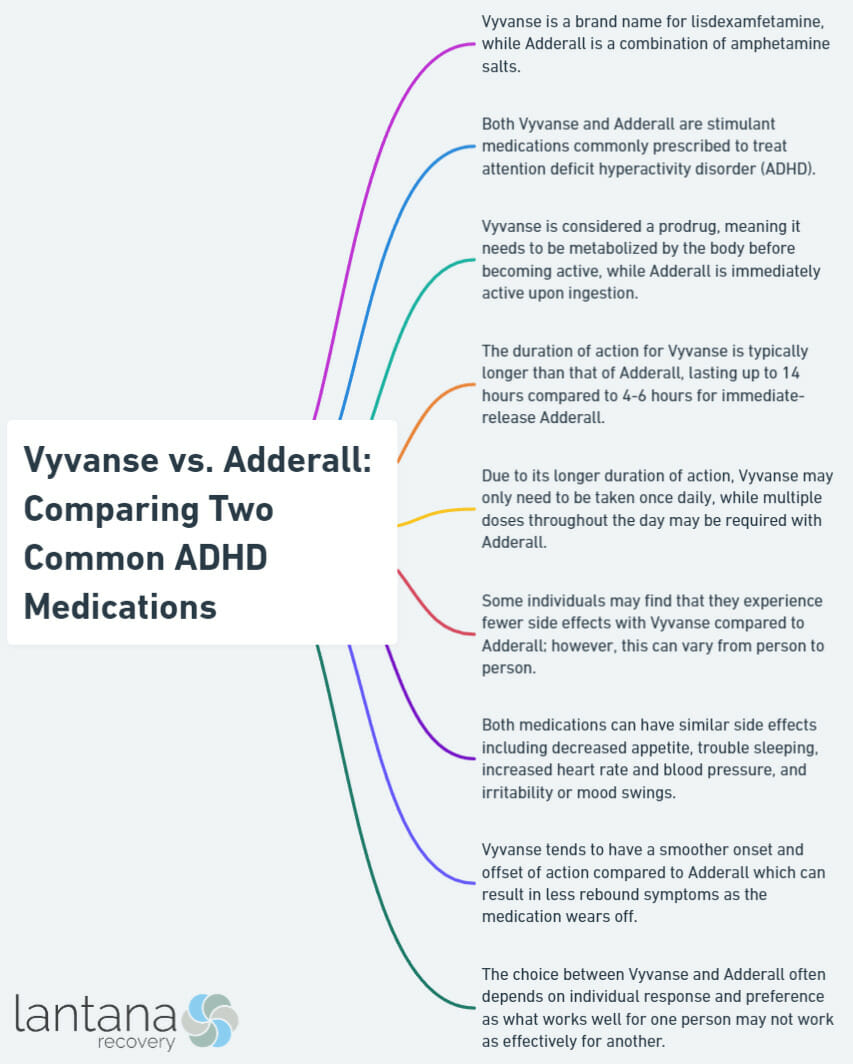
What is ADHD?
Attention Deficit Hyperactivity Disorder (ADHD) is a neurodevelopmental disorder that affects both children and adults. What is ADHD? ADHD is characterized by patterns of inattention, hyperactivity, and impulsivity. Understanding ADHD symptoms is important for effective management.
Symptoms of ADHD vary, but common indicators include difficulty paying attention, distractibility, forgetfulness, impulsivity, and restless behavior. These symptoms significantly impact daily functioning and performance.
Healthcare professionals and therapists at Lantana use specific criteria from the Diagnostic and Statistical Manual of Mental Disorders (DSM-5) to diagnose ADHD. The assessment considers history, behaviors, and symptom patterns. Interviews with the individual, parents, teachers, and others may be involved.
Knowing what ADHD is helps in seeking appropriate treatment. Management typically involves behavioral interventions, educational support, and medication.
ADHD is a highly treatable condition. With the right support, individuals can lead successful lives. Seek help from healthcare professionals specializing in ADHD for an individualized plan.
How is ADHD diagnosed?
ADHD is diagnosed through a comprehensive evaluation process that involves gathering information from multiple sources and assessing the individual’s symptoms and behaviors. A single test cannot definitively determine if someone has ADHD. Healthcare professionals rely on criteria outlined in the Diagnostic and Statistical Manual of Mental Disorders (DSM-5).
To diagnose ADHD, healthcare professionals consider the following factors:
- Symptoms: The individual must display a persistent pattern of inattention and/or hyperactivity-impulsivity that is more frequent and severe than what is typically observed in peers.
- Onset: The symptoms must have been present before the age of 12 and be present in multiple settings.
- Duration: The symptoms must have been ongoing for at least six months.
- Impairment: The symptoms must significantly interfere with the individual’s functioning or development.
- Rule out other conditions: Healthcare professionals will also rule out other possible explanations for the symptoms, such as medical conditions, learning disabilities, or emotional/behavioral difficulties.
It is important to have a qualified healthcare professional, such as a psychiatrist or psychologist at Lantana, specializing in ADHD to accurately diagnose the condition. They will consider the individual’s complete medical history, conduct interviews, and may use rating scales or questionnaires to gather information from the person, their family, and their teachers.
What is Vyvanse?
Vyvanse is a prescription medication used to treat ADHD. It is a central nervous system stimulant that affects certain brain chemicals to control hyperactivity and impulses. Vyvanse is taken orally, usually once daily in the morning. It comes in different strengths for individualized dosing based on each patient’s needs.
One advantage of Vyvanse is its long-lasting effects. After ingestion, Vyvanse is gradually converted into dextroamphetamine, which provides a gradual and sustained effect on ADHD symptoms throughout the day. The duration of the effects can range from 10 to 14 hours, depending on the individual.
Vyvanse primarily improves symptoms of ADHD, including inattention, hyperactivity, and impulsivity. It helps individuals with ADHD stay focused, be more organized, and control their behavior. However, it is not a cure for ADHD and should be used as part of a comprehensive treatment plan that may include behavioral therapy and other interventions.
When considering Vyvanse as a treatment option, it is essential to consult with a healthcare professional. They will evaluate the individual’s specific needs, medical history, and potential side effects of the medication. Factors such as age, overall health, and other medications being taken should also be taken into consideration.
How does Vyvanse work?
Vyvanse increases levels of certain brain chemicals that regulate attention and impulse control. It is a prodrug that becomes active after metabolization. After ingestion, Vyvanse is converted into dextroamphetamine, which stimulates the release of dopamine and norepinephrine. These neurotransmitters are important for focus, reducing hyperactivity, and improving attention in individuals with ADHD.
Vyvanse is a long-acting medication that slowly releases throughout the day, providing a consistent effect. This is achieved through the use of a prodrug technology called LDX (Lisdexamfetamine dimesylate), which has a longer duration of action compared to other immediate-release stimulant medications.
When considering how Vyvanse works, it is important to consult a healthcare professional to assess individual needs and provide guidance. Factors such as medical history, side effects, and lifestyle should be considered when choosing between Vyvanse and other ADHD medications.
Each person’s response to medication can vary, so it is crucial to follow the advice of a healthcare professional and monitor any changes in symptoms or side effects.
What are the common uses of Vyvanse?
The common uses of Vyvanse include treating ADHD in children, adolescents, and adults. Vyvanse improves focus, reduces impulsivity, and controls hyperactivity in individuals with ADHD. It also manages BED in adults, reducing binge eating episodes and increasing feelings of fullness. Vyvanse affects certain brain chemicals involved in impulse control and attention. It is a stimulant medication containing lisdexamfetamine.
Vyvanse should only be used under the supervision of a healthcare professional as part of a comprehensive treatment plan for ADHD or BED. Dosage and treatment duration should be determined by a healthcare professional based on individual needs and response to the medication. Discuss potential side effects, risks, and benefits with a healthcare professional before starting or stopping Vyvanse.
Vyvanse was approved by the FDA in 2007 for treating ADHD in children aged 6 to 12 years old. It is now approved for use in adolescents and adults as well. In 2015, Vyvanse received FDA approval for treating BED in adults, becoming the first medication specifically indicated for this condition. Vyvanse is a widely used and reliable treatment option for individuals with ADHD or BED, improving their symptoms and enhancing their quality of life.
What is Adderall?
Adderall is a prescription medication used to treat attention-deficit hyperactivity disorder (ADHD). It is a combination of two central nervous system stimulant drugs, amphetamine and dextroamphetamine. Amphetamine works by increasing certain brain chemicals to enhance focus and attention.
Adderall is commonly prescribed to both children and adults with ADHD to alleviate symptoms such as difficulties in attention, impulsivity, and hyperactivity.
It is important to note that Adderall should only be taken under the guidance of a healthcare professional. They will assess and diagnose ADHD and determine if Adderall is the appropriate treatment.
Studies have shown that Adderall effectively treats ADHD symptoms, improving attention, impulse control, and behavior management. However, it is important to consider potential side effects. Common side effects of Adderall may include increased heart rate, decreased appetite, trouble sleeping, and nervousness.
When considering Adderall as a medication, it is crucial to consult with a healthcare professional. They will take into account the severity of symptoms, medical history, current medication intake like Tylenol or other prescriptions, and individual needs to provide the appropriate dosage and monitor for any side effects.
How does Adderall work?
Adderall is a medication used to treat ADHD. If you wonder how Adderall works, it primarily increases certain brain chemicals to improve attention and reduce hyperactivity.
It accomplishes this by stimulating the release of neurotransmitters like dopamine and norepinephrine, which regulate attention and impulse control. By increasing these neurotransmitter levels, Adderall improves focus, attention, and reduces hyperactivity in individuals with ADHD.It also decreases impulsive behavior and improves cognitive function.
Adderall comes in immediate-release and extended-release formulations. The immediate-release version works quickly for about 4-6 hours, while the extended-release version lasts up to 12 hours.
It’s important to take Adderall only as prescribed by a healthcare professional to avoid serious health consequences and non-prescribed alternatives like Speed.
Common side effects of Adderall include increased heart rate, blood pressure, decreased appetite, and trouble sleeping.
It may also interact with other medications, so informing your healthcare provider is crucial. Understanding how Adderall works helps individuals with ADHD make informed treatment decisions. Therefore, consulting with a healthcare professional is essential to determine if Adderall is the right medication.
What are the common uses of Adderall?
Adderall is commonly used to treat attention deficit hyperactivity disorder (ADHD) in both children and adults. It improves symptoms such as inattentiveness, impulsivity, and hyperactivity. The common uses of Adderall include treating ADHD, managing narcolepsy, cognitive enhancement, and short-term weight loss.
1. Treating ADHD: Adderall is a first-line treatment for ADHD. It increases focus, reduces impulsivity, and improves hyperactivity. The medication stimulates certain brain chemicals that regulate attention and behavior.
2. Managing Narcolepsy: Adderall is prescribed to individuals with narcolepsy, a disorder characterized by excessive daytime sleepiness and sudden sleep attacks. It promotes wakefulness and reduces sleep attacks, allowing individuals to stay awake and alert.
3. Cognitive Enhancement: Some individuals use Adderall off-label for potential cognitive-enhancing effects. It improves mental clarity, concentration, and productivity, leading to better academic or work performance. However, it should only be used under healthcare professional guidance.
4. Weight Loss: Adderall may be prescribed for short-term weight loss. It suppresses appetite and increases metabolism, leading to reduced calorie intake and potential weight loss. However, it should never be used solely for weight loss and should always be prescribed and monitored by a healthcare professional.
It is important to remember that Adderall should only be used under the guidance and prescription of a healthcare professional. Different individuals may respond differently to the medication, and the dosage and duration of treatment will vary based on specific needs and medical history.
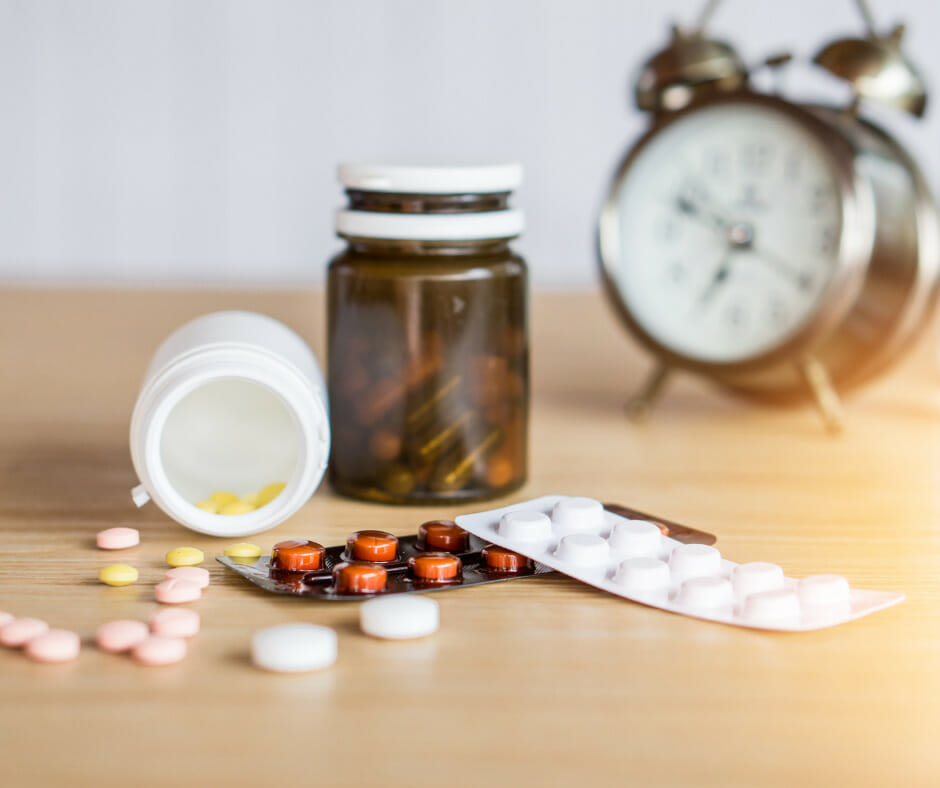
Comparing Vyvanse and Adderall
When it comes to ADHD medications, two names frequently come up: Vyvanse and Adderall as “amphetamine is the most prevalent prescription stimulant in the United States, both medically and nonmedically” (Discordant reporting of nonmedical amphetamine use among Adderall-using high school seniors in the US, Palamar & Le, 2017.) In this section, we’ll dive into the world of comparing Vyvanse and Adderall. From exploring their similarities to uncovering their differences, we’ll reveal everything you need to know about these commonly used medications. So buckle up and get ready to discover the distinctive features that set Vyvanse and Adderall apart.
Similarities between Vyvanse and Adderall
When comparing Vyvanse and Adderall, it can be observed that they share several similarities. Firstly, both medications are used for the treatment of ADHD. Additionally, they belong to the stimulant class of drugs. It is worth noting that they both work by increasing dopamine and norepinephrine levels in the brain, resulting in improved attention, decreased impulsiveness, and better control of hyperactivity in individuals with ADHD.
Furthermore, both Vyvanse and Adderall come in extended-release formulations, providing a longer duration of effect. This allows for sustained symptom management throughout the day. It is important to mention that these medications can also have similar side effects such as loss of appetite, difficulty sleeping, and increased heart rate.
In terms of usage, both Vyvanse and Adderall should be taken as prescribed and require regular follow-up visits with a healthcare professional. It is crucial to adhere to the prescribed dosage and store them securely as both medications have the potential to be abused and are habit-forming.
When deciding between Vyvanse and Adderall, it is advisable to consult with a healthcare professional who can consider individual factors and preferences to determine the most suitable option.
Differences Between Vyvanse and Adderall
Differences between Vyvanse and Adderall can be summarized in a table. Both medications are commonly used for ADHD treatment, but they have key distinctions.
| Factors | Vyvanse | Adderall |
|---|---|---|
| Active Ingredient | Lisdexamfetamine | Mixed amphetamine salts |
| Time Release | Extended-release formulation | Immediate-release and extended-release |
| Duration of Action | Up to 14 hours | Up to 12 hours (immediate-release), up to 8-12 hours (extended-release) |
| Dosage Options | 10 mg, 20 mg, 30 mg, 40 mg, 50 mg, 60 mg | 5 mg, 7.5 mg, 10 mg, 12.5 mg, 15 mg… |
| Treatment Approach | Helps control symptoms throughout the day | Immediate relief of symptoms, some extended relief |
| Potential for Abuse | Lower abuse potential | Higher abuse potential |
Vyvanse contains lisdexamfetamine, which gradually converts to dextroamphetamine in the body. It is an extended-release medication that provides symptom control for up to 14 hours. On the other hand, Adderall is a combination of amphetamine salts, available in immediate-release and extended-release forms. The immediate-release version offers quick relief, while the extended-release version provides longer-lasting effects.
When comparing duration of action, Vyvanse has a slightly longer duration than Adderall. Vyvanse dosage options range from 10 mg to 60 mg, while Adderall offers a wider range, starting from 5 mg.
Vyvanse has a lower potential for abuse compared to Adderall, as it is slowly converted to dextroamphetamine in the body. However, both medications can be addictive if misused. When choosing between Vyvanse and Adderall, consult a healthcare professional to assess specific needs and discuss potential benefits and side effects of each medication.
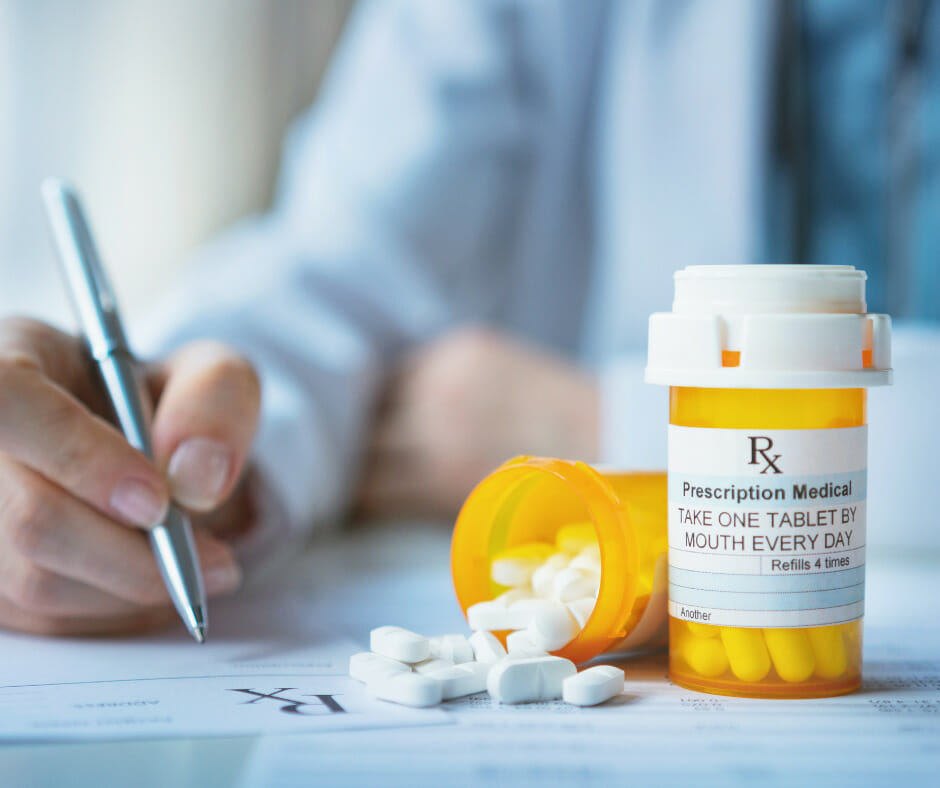
Efficacy and Side Effects of Vyvanse
Discover the power of Vyvanse when it comes to treating ADHD symptoms and its potential side effects. From boosting focus to managing impulsivity, this sub-section will explore the efficacy of Vyvanse in addressing ADHD symptoms. Plus, we’ll delve into the common side effects associated with its use. Get ready to dive into the world of Vyvanse and gain valuable insights into its effectiveness and potential considerations.
Efficacy of Vyvanse in treating ADHD symptoms
The efficacy of Vyvanse in treating ADHD symptoms is well-established. Vyvanse effectively reduces the core symptoms of ADHD, including inattention, hyperactivity, and impulsivity. In a randomized controlled trial with children, Vyvanse significantly improved ADHD symptoms by 58% compared to a placebo.
Research also shows that Vyvanse has a longer duration of action than other ADHD medications. It provides sustained symptom control throughout the day due to its extended-release formulation. This formulation ensures a gradual and consistent release of the medication, resulting in continued symptom relief.
It’s important to consider that the efficacy of Vyvanse in treating ADHD symptoms can vary among individuals. Factors like age, dosage, and comorbidities may influence the treatment response. Consultation with a healthcare professional is recommended to determine the appropriate dosage and monitor the response to Vyvanse treatment.
Common side effects of Vyvanse
- Common side effects of Vyvanse include loss of appetite, which can result in weight loss.
- Insomnia is another common side effect of Vyvanse, especially if taken late in the day. It is important to follow the recommended dosage to minimize sleep issues.
- Dry mouth is a discomforting side effect of Vyvanse that can increase the risk of dental problems. Staying hydrated and practicing good oral hygiene can help alleviate this.
- Headaches ranging from mild to severe may occur as a side effect of Vyvanse. If headaches persist or worsen, seeking medical advice is important.
- Vyvanse can lead to an increased heart rate or palpitations. Individuals with underlying heart conditions should exercise caution and consult their healthcare provider before taking Vyvanse.
It is important to note that not everyone will experience these common side effects of Vyvanse, and their severity may vary. If you are considering taking Vyvanse, discussing the potential side effects with a healthcare professional is essential. They can provide personalized advice and guidance based on your specific medical history and needs. Remember to weigh the benefits of the medication in managing ADHD symptoms against the potential side effects to make an informed decision.
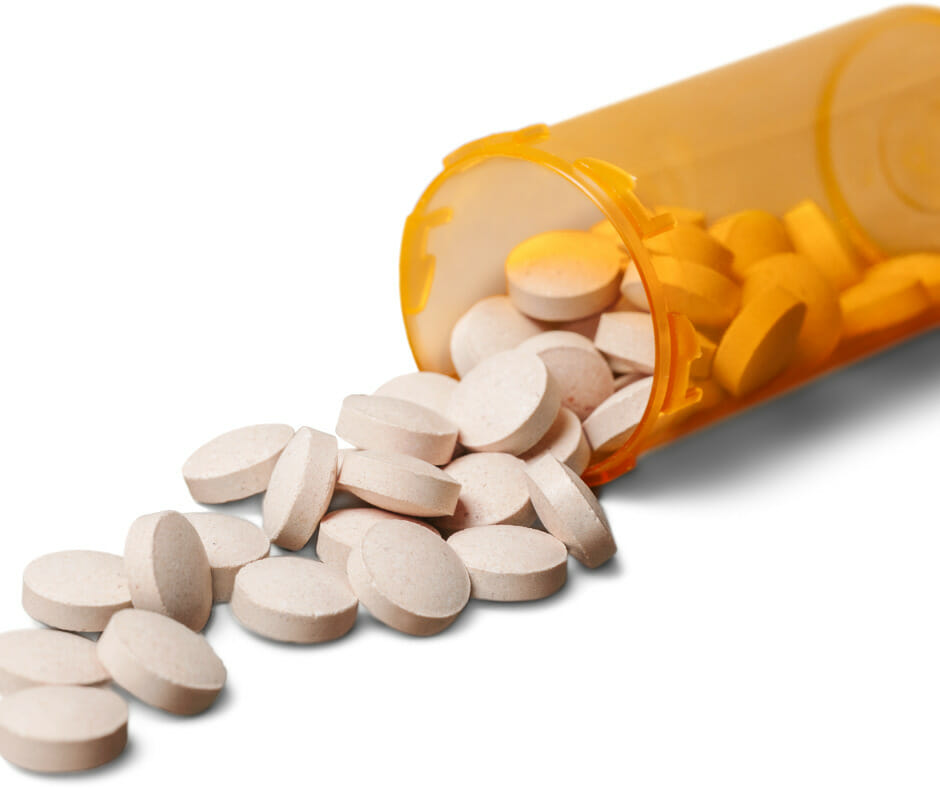
Efficacy and Side Effects of Adderall
When it comes to treating ADHD symptoms, understanding the efficacy and potential side effects of Adderall is crucial. In this section, we’ll explore how Adderall fares in alleviating ADHD symptoms and delve into the common side effects associated with its usage. Get ready to uncover the facts, figures, and insights about Adderall that can help you make informed decisions about your ADHD treatment journey. So, let’s dive in and discover what Adderall has to offer in terms of effectiveness and its potential effects on your well-being.
Efficacy of Adderall in treating ADHD symptoms
The efficacy of Adderall in treating ADHD symptoms is well-supported by scientific research. Numerous studies have demonstrated that Adderall can effectively reduce symptoms of attention deficit hyperactivity disorder (ADHD), including inattention, hyperactivity, and impulsivity.
A study titled When we enhance cognition with Adderall, do we sacrifice creativity? by Farah et al., explored how Adderall, a medication frequently used for cognitive enhancement, has been linked to potential effects on creativity in individuals without underlying health conditions.
While Adderall is undeniably highly effective in addressing ADHD symptoms, it’s important to acknowledge that individual responses may differ. Certain individuals may experience more pronounced improvements compared to others.
Like any medication, Adderall carries the potential for side effects, including increased heart rate, elevated blood pressure, decreased appetite, and difficulty sleeping. Prior to initiating Adderall treatment, it is crucial to consult with a healthcare professional to discuss any potential risks or concerns.
Common side effects of Adderall
Common side effects of Adderall include insomnia, loss of appetite, dry mouth, headaches, and increased heart rate.
- Insomnia can lead to daytime drowsiness and affect overall well-being.
- Adderall has been known to suppress appetite, leading to weight loss.
- To alleviate dry mouth, individuals can stay hydrated and chew sugar-free gum or suck on ice chips.
- If headaches become severe or persistent, it is recommended to consult a healthcare professional.
- Adderall can raise heart rate, causing palpitations or a racing heartbeat, so it’s important to monitor heart rate regularly and report any irregularities to a healthcare professional.
- It is important to note that not everyone experiences these side effects, and they can vary in severity.
If any of these side effects become bothersome or persist, it is advised to consult a healthcare professional. They may be able to adjust the dosage or prescribe an alternative medication if necessary.
One true story of a common side effect of Adderall involves a young adult named Emily. Emily was prescribed Adderall to manage her ADHD symptoms. While the medication improved her ability to concentrate and stay focused, she experienced a loss of appetite. This resulted in significant weight loss.
Emily consulted her healthcare professional, who recommended monitoring her food intake and trying to eat smaller, more frequent meals throughout the day. By implementing these strategies and prioritizing proper nutrition, Emily managed her appetite while still benefiting from the focus-enhancing effects of Adderall.
Choosing Between Vyvanse and Adderall
Choosing between Vyvanse and Adderall is a crucial decision for those seeking effective ADHD medication. We’ll explore key factors to consider when making this choice and the importance of consulting with a healthcare professional. Delve into the world of ADHD treatment options and discover the best path forward. Lacking clarity? Don’t worry, we’ll provide the insights you need to navigate this decision with confidence. Let’s dive in and find the medication that suits your unique needs.
Factors to consider when choosing between Vyvanse and Adderall
When deciding between Vyvanse and Adderall for treating ADHD, it is important to consider the following factors:
- Efficacy: Both medications effectively treat ADHD symptoms, but individual responses may vary. It is advisable to consult with a healthcare professional to determine the best medication for you.
- Side effects: Both Vyvanse and Adderall can cause decreased appetite, difficulty sleeping, and increased heart rate. It is crucial to discuss potential side effects with your doctor and weigh them against the medication’s benefits.
- Duration of action: Vyvanse provides longer effectiveness compared to immediate-release Adderall. This may be beneficial for individuals needing coverage throughout the day.
- Dosing flexibility: Adderall offers more dosing options than Vyvanse, with immediate-release and extended-release formulations available.
- Individual preferences: Personal experiences with medication vary, and it is important to consider individual preferences. Some may find one medication more tolerable or experience fewer side effects.
It is recommended to consult a healthcare professional to make an informed decision based on your specific needs and medical history. They can provide personalized guidance aligned with your treatment goals.
Consulting with a healthcare professional
Consulting with healthcare professionals is essential when considering the choice between Vyvanse and Adderall for treating ADHD. A healthcare professional can evaluate your symptoms and medical history to determine which medication may be more effective for you. They can also provide information about the similarities and differences between Vyvanse and Adderall, including their mechanisms of action and common uses. Additionally, a healthcare professional can discuss the potential efficacy of each medication in treating ADHD symptoms and any possible side effects.
Factors like age, overall health, and individual preferences can also play a role in choosing the most suitable medication. They can provide guidance on appropriate dosage, frequency of medication intake, and monitoring effectiveness. Remember that this information is for informational purposes only and should not replace the advice and guidance of a qualified healthcare professional. Consulting with a healthcare professional is the best way to make an informed decision about the choice between Vyvanse and Adderall for treating ADHD.
Consulting with healthcare professionals at an outpatient tretament center for addiction has always been crucial in making informed medical decisions. Their expertise and guidance ensure individuals receive appropriate and effective treatments. Throughout history, people have sought healthcare professionals’ advice for medication choices, surgical interventions, and preventive care. In modern times, consulting with healthcare professionals remains vital as it helps individuals navigate complex medical information, understand treatment options, and prioritize their health. Medical advancements and research continue to drive the importance of consulting with healthcare professionals, improving overall quality of life.
Frequently Asked Questions
What are the main differences between Vyvanse and Adderall?
Vyvanse and Adderall are both stimulant medications used to treat ADHD, but they differ in composition and duration of action. Adderall is a combination drug containing four different types of amphetamines, while Vyvanse contains only one type of amphetamine salt known as lisdexamfetamine. Additionally, Adderall comes in both an immediate-release and extended-release form, with the latter lasting 8 to 12 hours. On the other hand, Vyvanse, due to the inclusion of lysine, can last up to 14 hours. It is important to consult with a healthcare professional to determine which medication is most suitable for your specific needs.
Are Vyvanse and Adderall FDA approved for conditions other than ADHD?
Yes, both Vyvanse and Adderall are FDA approved for conditions other than ADHD. Vyvanse is also approved for the treatment of moderate-to-severe binge eating disorder in adults, while Adderall is approved to treat narcolepsy, a sleep disorder characterized by excessive daytime sleepiness and sudden onset of sleep.
Is Vyvanse or Adderall more likely to cause dependence or misuse?
While it is possible to abuse or become dependent on any stimulant medication, Vyvanse may be less likely to be misused compared to Adderall. Vyvanse requires the body to process lysine before releasing the stimulant component, which may reduce its potential for immediate abuse. However, it is important to follow the prescribed dosage and use these medications under the guidance of a healthcare professional to minimize the risk of dependence or misuse.
Can Vyvanse or Adderall be used to treat bipolar disorder?
Individuals with bipolar disorder should not take stimulant medications like Vyvanse or Adderall without consulting with their healthcare professional. These medications can potentially worsen symptoms of bipolar disorder or trigger manic episodes. It is crucial to disclose any existing mental health conditions to your healthcare provider to ensure the safe and appropriate use of medications.
Are there any head-to-head studies comparing the effectiveness of Vyvanse and Adderall?
There are limited head-to-head studies directly comparing the effectiveness of Vyvanse and Adderall. However, separate studies have shown positive results for both medications in treating symptoms of ADHD. One study examined the effect of both drugs on classroom-based behavior in children with ADHD and found that both Vyvanse and Adderall were equally effective at improving attention span and interactions with others. Similar results were observed in a trial involving adults with ADHD. It is important to work with a healthcare professional to determine the most suitable treatment option based on individual needs and responses.
Are there any differences in cost between Vyvanse and Adderall?
The cost of Vyvanse and Adderall can vary based on the dosage and form of the medication. Currently, Adderall is generally cheaper because it is available in a generic form. However, a generic form of Vyvanse is expected to become available in August 2023, which may help reduce its cost. It is advisable to check insurance coverage and consult with the healthcare provider or pharmacist to determine the specific cost of these medications.









